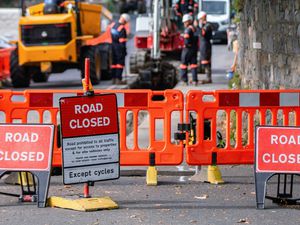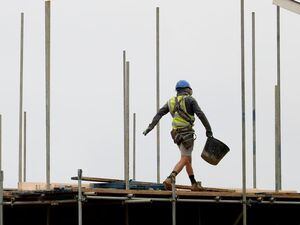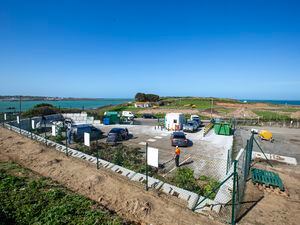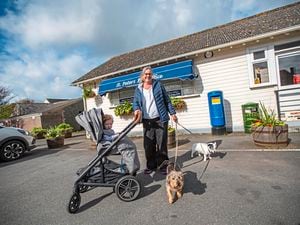Island needs to act fast to secure a prosperous future
Senior finance sector figure John Roche offers his personal view on steps needed towards a brighter future in the wake of the Covid-19 pandemic and up to £500m. of public borrowing to power recovery. Today he considers a range of potential initiatives to help islanders
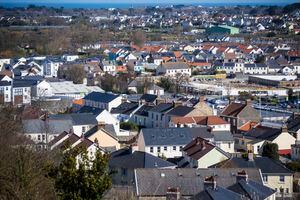
RETURNING people to work will present challenges for their safety travelling about as well as reorganising their work environment. This may also be a costly phase and workers may even need to reskill to remain employable or to get employment. Those businesses that can remote work should be guided to do so for as long as is really possible, thus allowing government and other businesses to crack on with a return to work for the local economy.
Social distancing will be around for some time, so government being clear on that message will allow business to plan and to spend sensibly for the return to work. Here again we are all reliant on each other and sensible measures being taken as we come out of lockdown. Underinvestment here, which could happen if guidance is too optimistic, would only add to the risk of a second lockdown, which would be more damaging. The borrowing also helps ease some of the worries of a potential second lockdown.
So there will be a need for government to subsidise the costs of those businesses as they spend on return-to-work measures for staff and their properties. Subsidies will also be likely for public transport (buses) as load factors just won’t work in social distancing and transport is key. It will be vital for those businesses to gain the confidence of their workers when asking them to return as there will be a high percentage that will be nervous or inhibited with having young families, health issues themselves or the people they live with, living with key health and other workers etc. So it is not as simple as saying: ‘Let’s allow all the younger people back to work’. Also a lot of ‘younger people’ are employed by hospitality/tourism/travel businesses where demand will be reduced for some considerable time. Directing these workers to where the work is in the economy will also be important, like to infrastructure projects perhaps.

Taking cars off the road is also a good thing for the environment and our general health but travel by car is better for containing the spread of the virus I suspect. We are a small island and therefore we should be looking at modes of transport. Cycling has been boosted in the crisis so why not invest in proper island infrastructure to keep it that way with safe cycle pathways on our roads, facilities to properly store them, subsidised purchase costs for e-cycles when warranted etc. Why not push electric cars with incentives to trade in and buy? Why not have ample charging points on the island for electric cars? Arguably not needed a lot with the short distances travelled, so assist homeowners with proper charging points being installed?
The fast adoption of new technology in the crisis and social distancing will mean there is some unemployment as businesses shut down and in some cases jobs that people did pre-crisis will no longer be needed. People may need to look for different work with different firms in different sectors and efficiently matching these people with lots of smaller businesses in differing sectors will be a challenge.
Government should ensure that platforms to do this are invested into and work. Money will be needed to incentivise retraining programmes by government and in industry to ensure that private sector vacancies are properly matched by the skill sets of those that are available. This takes time and investment.
Investing in a real digitally trained workforce could be transformative. I would also ask government to accelerate their push for digitising the delivery of their services. And aligned to this, and I am no expert, but should we not be upgrading our broadband provision?
Not everyone will be able to return to work properly and immediately where for instance they have young families of pre-school or school age. So now is the time to properly deal with, set up and fund universal pre-school provision. The long-term benefits for any economy are well set out, with more diverse workforce participation and the early development of children being key. A costly exercise and one to be tackled now, not deferred or weakly commented upon. Getting schools back is also vital and with social distancing measures needed, this will also require investment in premises reconfiguration, technology and training.

Public investment in infrastructure is key as that improves our economic environment, engages the crucial construction sector, employs people etc. Government is now signalling this and I am keen to see what develops. Eastern seaboard development which would bring more people living, working and socialising to that part of the island would be beneficial. Build up and transform buildings in and around St Peter Port and in the wider eastern seaboard. There are far too many empty buildings and shops in Town which could be converted to decent and central accommodation. These moves may also hasten a much-needed decrease in our dependence on cars for transport with people having shorter journeys to work etc.
Using our money to invest and skill people for our growing industries will be key and not wasting time and money on declining industries. This also takes government policy and money to get right. Some industries, perhaps like high street retail, may not come back to where they were pre-crisis.
We have a current and even larger forecast funding crisis with the health and social care costs of our population living longer. These demographic trends have been ignored for too long and now is the time to deal with them properly. I am sure we have projected gaps in the future need for residential aged care, community aged care, home and community care and hospital beds. How many additional carers for the aged care sector will be needed by say 2025-30, as well as extra nurses across both the health and ageing sectors? We must be seeing a shortfall in social infrastructure that supports health and ageing. There are other gaps – in allied health services, in palliative care, in community and informal care. Overall, these gaps fall across both ‘hard’ social infrastructure – physical infrastructure such as buildings, equipment and technology (including digital health) and ‘soft’ social infrastructure – including workforce (paid and unpaid), processes, models of care, and payment and funding mechanisms. You cannot just scale this up to meet a growing demand as government budgets would be swamped. Without fundamental change, even within the next election cycle, the health and ageing system will quickly become unsustainable and no longer fit for purpose – much of this is driven by a change in demand from acute inpatient care, towards looking after people with longer term chronic conditions. Where are we with preventative and early interventions around our health systems?
So we need to have a properly funded social care programme that allows people to remain living at home for as long as is physically and mentally possible. Our care homes must be better linked into and looked after in partnership with government as I feel we will need to have more of them in the not too distant future. This will cost and we cannot just hope that we can fund it from current revenues from current taxpayers.
We were never supposed to be able to live properly just on an old age pension, so the moves to the new secondary pension scheme are to be applauded. We must all contribute more towards our care costs for later in life either in taxes or by adopting schemes that help this later provision. One such scheme could require homeowners in need of care home or other social care provision being required to put their homes up as collateral with a later and properly timed sale being used to reimburse government as well as settling monies to any heirs.
Our tax system also now needs to be tackled and tackled decisively. Reliance on fuel duty is now a flawed strategy, our corporate zero/10 regime could now be looked at and extended as I feel there are a growing number of corporates that would be content with paying more in tax locally (profit- driven taxes are not the most effective or reliable over time, but they can form an important component of the overall tax take), we are too reliant on income tax, more effective property taxes could be looked at to get people to develop empty properties, motor tax could be reintroduced, GST must be looked at etc.
Austerity and tax hikes are not what I am advocating. Government will be borrowing and thankfully spending locally and therefore it will need to have a good foundation to its tax system, one that is built on what the future may look like. The tax take as a percentage of GDP is still relatively low by international standards I think, so I am talking about a proper rebalancing of the tax system so that those who can shoulder a bigger share do that.
If post-crisis we feel we are thankful for what our government has done, then as a society we may be asking for government to remain as is or to even get bigger. So, there are hard questions about how we would fund that decision. This will need careful attention as those bodies who are loaning us the money will want to see that government is taking all the measures to be fiscally sensible and to be positioned to service and ultimately repay the debt (unless we decide to remain borrowed for longer).
Let’s also deal with some low hanging fruit and easy wins. Two come to mind for me but we must have countless more we can deal with and save time and money by just being decisive. So, why do we need to go to court to conveyance property? Also, why is every small traffic offence in need of a court appearance? Both a waste of time and money, so let’s just stop both now.
The leadership, openness and decisiveness I have seen to date has been exemplary and I will add my thanks to everyone else’s in the wider community. Closing down the economy was absolutely a public health requirement to deal with the crisis we were and continue to face. Opening it up again is a massive challenge and one that has never been faced before. Yes, we need to see the outline of an economic recovery plan, it won’t be perfect and there will be mistakes made, but in a spirit of Guernsey Together, we will all need to embrace it and do our bit.

